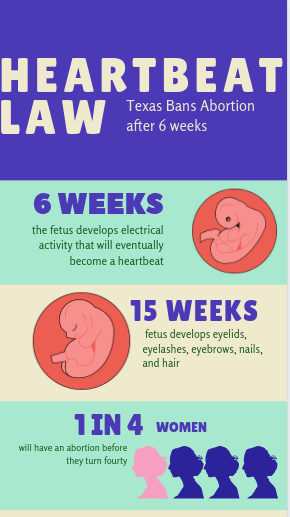Texas and Mississippi enact new abortion restrictions

Abortions affect a significant population of American women.
September 27, 2021
Texas and Mississippi have passed restrictions on abortion that make it nearly impossible for a woman to terminate her pregnancy, and the Supreme Court voted to uphold these laws.
“I worry that doctors and nurses will be put in a very difficult situation between doing what they know to be right for the health and well being of their patients, and also fear of retribution by society for the medical choices that they make. I also know that women will be put in a difficult situation that forces them to make dangerous/unhealthy choices,” said AV Child Growth and Development teacher Julia Ford.
In Texas, the “Texas Heartbeat Act” enforces “limitations” on abortion that, in reality, are a near-complete ban. This law states that any abortion after 6-weeks from a woman’s most recent menstrual cycle is not permitted. Hence, it also prohibits physicians from performing abortions after this point–and it relies entirely on citizens to enforce this law.
In fact, the law says that “no enforcement of Chapters 19 and 22, Penal Code, in response to violations of this subchapter, may be taken or threatened by this state, a political subdivision, a district or county attorney, or an executive or administrative officer or employee of this state or a political subdivision against any person.”
The Texas Heartbeat Act makes aiding a woman to get an abortion on a fetus with a heartbeat (around the 6-week mark) a criminal act, and allows private citizens to sue anyone who has done so for up to $10,000.
“Interestingly, at 6 weeks, there isn’t actually a beating heart, it is just electrical activity that will eventually become the heart. [The fetus] is basically a ‘C’ shaped figure and structures necessary to the formation of things such as eyes, ears, and arms are starting to appear…I do not think that 6 weeks is a logical time for the abortion cutoff to be,” said Ford.
In Mississippi, the new law, often referred to as “the Ban,” bans abortions after the 15-week point, except for “medical emergencies,” (one that would threaten the life or long-term function of the mother and her body) and “severe fetal abnormality.”
“I would say at six weeks there are probably many women who don’t know they’re pregnant, so it doesn’t seem to be in line with what would be right. A fetus at that stage is like an eighth of an inch, so the development is very minute. At fifteen weeks there’s quite a bit more development and I would say females with a regular cycle probably would know that something was up and that they were pregnant,” said AV Human Body Systems teacher Renee Ogle.
The “Women’s Health Protection Act,” which would give health-care providers the right to provide abortions in all states, has been passed in the House but still has to face the evenly-divided Senate.




